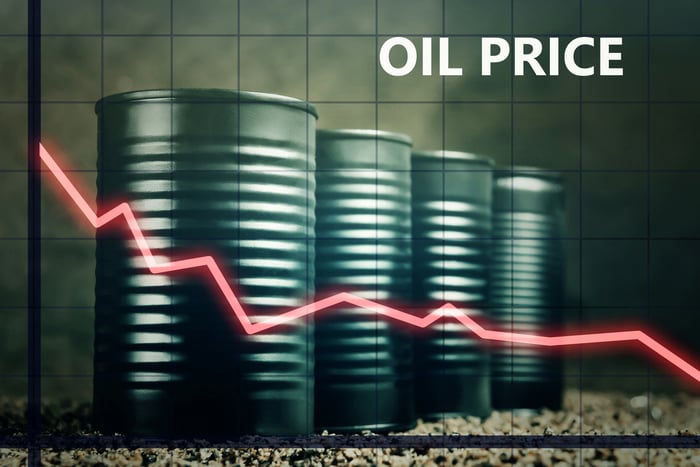This year's oil market downturn has sparked a steady stream of bankruptcy filings in the industry. The sector's biggest one yet came in late June, when Chesapeake Energy finally collapsed under the weight of its debt. Two weeks later, frack sand producer Hi-Crush followed Chesapeake and its rivals Covia and Vista Proppants & Logistics, which both filed in June.
More bankruptcies seem inevitable despite the recent rebound in crude oil prices because so many oil companies are in financial trouble. Three that look like the next dominos to fall are oil producers California Resources (CRC), Denbury Resources (DNR), and offshore driller Valaris (VAL).

Image source: Getty Images.
Hanging by a thread
California Resources -- the largest oil and gas producer in its namesake state -- is living on borrowed time. The company has been struggling to scrape up enough cash to pay the interest on its roughly $4.9 billion of debt. While the company did make its semiannual interest payment on a $2.25 billion note on June 24, it was nearly a month and a half late. Meanwhile, the company has entered into a series of forbearance agreements with other lenders to buy it more time to regain compliance with its financial covenants.
With another interest payment due this month and a mountain of burdensome debt on its balance sheet, it seems like a matter of time before California Resources declares bankruptcy. A report in May suggested that the company is seeking $500 million to $600 million in funding ahead of a bankruptcy filing. Meanwhile, a subsequent report in June suggested that bankruptcy was imminent. While the company's recent forbearance agreements have kicked this can down the road, it seems inevitable that the oil and gas producer will go this route to restructure its debt.
Teetering on the brink
Bankruptcy also seems unavoidable for Denbury Resources. The oil company elected not to make an $8 million interest payment due at the end of June, triggering a 30-day grace period before it's in default. It also recently drew down most of its remaining available credit -- about $200 million -- usually a precursor to declaring bankruptcy.
Given Denbury's liquidity, it can afford to make last month's interest payment. However, what it's struggling to do is manage its mountain of debt, which stood at more than $2.2 billion at the end of March. While it had been chipping away at that debt by repurchasing small portions on the open market with free cash flow, it's no longer generating much excess cash because of this year's oil market downturn. It seems likely that Denbury will end up declaring bankruptcy at some point this year so that it can restructure this debt.
Plunging toward bankruptcy
Offshore driller Valaris is in the same boat as these oil producers. This year's oil market downturn crushed its chances of riding the wave of a recovery in the offshore drilling market, which finally started showing signs of life last year. Instead of putting more rigs to work this year, Valaris expects it to take another two years before it can reactivate rigs it had to idle this year because of lack of work.
The company seems destined to follow in the footsteps of rival Diamond Offshore Drilling by declaring bankruptcy this year. It already chose not to make a $13.3 million interest payment in mid-June -- despite having more than $208 million of cash on hand and $1.3 billion of available credit -- triggering a 30-day grace period. While it has since signed forbearance agreements with some of its creditors to buy it more time, bankruptcy seems like the only option for the company to restructure its $6.8 billion debt load.
Their days are numbered
This trio of oil stocks seems likely to declare bankruptcy by the end of this year. That will enable them to work out deals with their creditors to reduce their hefty debt loads. In exchange, these companies will probably hand over a large chunk of their equity, most likely wiping out their existing shareholders. Investors should stay away from these oil stocks, since they'll probably end up worthless.





